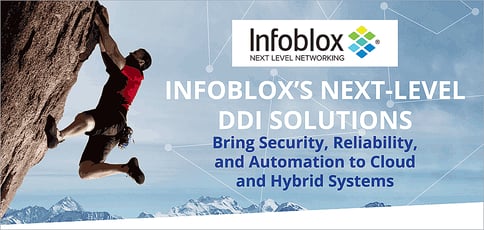
TL; DR: Infoblox, founded in 1999 to deliver enterprise-grade DDI solutions, empowers businesses to securely and reliably manage on-prem, cloud, and hybrid networks through actionable intelligence on a centralized platform. Today, the company serves up next-level solutions to more than 8,000 enterprise, government, and service provider customers worldwide, including 350 of the Fortune 500. Through rapid automation of core services, Infoblox is continuing to transform the way businesses deploy network and security solutions through the cloud.
In 1999, Stuart Bailey founded Infoblox to bring robust, business-class networking to a market he believed lacked secure and reliable solutions.
At the time, most network managers relied on Berkeley Internet Name Domain (BIND), a popular open-source Domain Name System (DNS) software used to translate domain names into IP addresses on Linux servers.
“Stuart knew customers needed an enterprise-grade solution that could support large networks through more capacity, better reporting, failover, and centralized management,” said Krupa Srivatsan, Director of Product Marketing at Infoblox. “All of those things were unavailable back then through BIND.”

Krupa Srivatsan, Director of Product Marketing, gave us the scoop on Infoblox’s enterprise-grade DDI solutions.
To serve enterprises’ needs, Infoblox developed its patented Infoblox Grid to provide a unified, highly available network platform for essential services — such as DNS, Dynamic Host Configuration Protocol (DHCP), IP address management (IPAM), Network Time Protocol (NTP), and Trivial File Transfer Protocol (TFTP) — based on a distributed database technology.
“The grid architecture links a network of appliances that talk to each other in a secure, encrypted fashion, providing a single integrated system that is highly available,” Krupa said. “It’s sharing data, but is also managed in a centralized way using the Grid Master.”
Since then, the company has remained dedicated to introducing the next-level services businesses need to thrive in an evolving digital environment. Today, that means navigating diverse challenges in DNS, DHCP, and IPAM (collectively known as DDI) by bringing security, reliability, and automation to cloud and hybrid systems.
“From the perspective of DDI, nobody offers the level of automation and security that we do,” Krupa said. “Infoblox has continued to go beyond just DDI. It provides several unique visibility and security capabilities because of where the technology sits in the network. DDI data is a gold mine that can provide information on device and user activity, and context on threats and infections for faster remediation. It’s been our focus to innovate and add more value to fulfill the needs of our customers on a consistent basis.”
A Recognized Leader in Secure Cloud-Managed Network Services
February 2019 marks Infoblox’s 20th birthday — and a quick stroll down memory lane illustrates just how much innovation the company has brought forth in that time.
Infoblox unveiled SilverBox, its first nonstop DNS and DHCP solution, in 2005. After acquiring iPANTO in 2007, the company also began to specialize in IPAM, becoming a recognized leader in DDI. In 2010, Infoblox acquired Netcordia to add network task automation and configuration management to its suite of technologies. The company also began offering integration with leading virtualization and cloud platforms, including AWS, Azure, Docker, OpenStack, and VMware.

Infoblox’s continuous innovation empowers admins to take command of their networks.
The company started offering DNS security capabilities in 2013, including malware mitigation using DNS firewalling, data exfiltration prevention using behavioral analytics and DNS DDoS protection, offering customers an added layer of protection and bridging the DNS security gap. In 2016, it acquired IID, a global leader in cyberthreat intelligence that aggregates threat data from law-enforcement agencies, Internet infrastructure providers, and open-source providers, to offer customers high-quality threat intelligence and threat investigation capabilities and ease the burden of security operations teams.
Manage Diverse DDI Challenges Using a Next-Generation Platform
In a hyperconnected world packed with emerging IoT devices, evolving infrastructure, and constant security threats, network management and security have undoubtedly become increasingly complex and expensive tasks. Infoblox provides solutions that help organizations control their networks, establish cutting-edge datacenters, reduce risk, ease the operational burden and gain insight for better decision-making in a digital economy.
“Today’s networks must be agile, solid, and secure while ensuring visibility across the entire ecosystem,” Krupa said. “DDI is great, but there’s much more to it than basic DNS protocol — it’s supporting hybrid and public cloud environments, it’s adding integration with key providers, it’s providing automation, and it’s protecting data.”
GDPR, the European privacy regulation, which has far-reaching global impacts, took effect on May 25, 2018. Infoblox has released a four-part blog series packed with GDPR compliance advice and information on how Infoblox technology can help in a network security context.
Safeguard Your Network with Infoblox’s Security Solutions
Krupa said that DDI technologies play an essential role in proactively containing attacks, safeguarding data, providing end-to-end visibility and automating security operations for faster incident response. Infoblox’s security solutions, for example, allow an organization to increase security measures through tight integration of networking and security infrastructure intended to eliminate gaps in security defenses.
“Early detection is key and the first point of connection for infected devices and malware is DNS,” Krupa said. “There are a lot of other activities that occur through DNS, like DNS tunneling and data exfiltration. Infoblox has the capability to detect these threats, not just through reputational data, but also using analytics and machine learning, for those that threats that don’t show up in any threat feeds.”
Organizations make significant investments in making sure their networks are secure. However, many security systems are complex to configure and implement, work in silos, and don’t scale to the level needed to protect today’s dynamic networks. Also, security operations teams are heavily short staffed, use siloed tools and manual processes to gather information, and have to deal with thousands of alerts every day.
What’s needed is a scalable, simple, and automated security solution that can catch threats in today’s dynamic networks, even in IoT environments. DNS is critical to the fabric of the internet and any IP based communication. It serves as the perfect foundation for security because it is simple to deploy, ubiquitous in networks, is needed for connectivity anyway, and can scale to the size of the Internet.
Infoblox security solutions provide pervasive, scalable, cloud managed, hybrid security that protects users and devices anywhere — on-premises, while roaming, or in remote offices — from attacks. The solutions automatically share data with the rest of the security ecosystem for faster incident response and improve the ROI of those technologies. The solutions can be deployed on-premises, delivered from the cloud, or in a hybrid architecture, all managed by Infoblox’s next-generation SaaS platform.
Rapid Automation of Core Network Services for Datacenters
Infoblox prides itself on empowering network admins to automate crucial tasks that improve performance and availability. Employing automation also helps businesses stay one step ahead of the competition through cost-cutting measures.
In an effort to maintain focus on automation, Infoblox recently released updates to its Network Identity Operating System (NIOS) that enable businesses to automate core network services for datacenters rapidly.
Krupa said new product launches and updates are run through a Technical Advisory Board (TAB) to ensure user satisfaction. “We always stay close to the customers to make sure to keep our eyes and ears open to what they need,” she said.
HostingAdvice.com is a free online resource that offers valuable content and comparison services to users. To keep this resource 100% free, we receive compensation from many of the offers listed on the site. Along with key review factors, this compensation may impact how and where products appear across the site (including, for example, the order in which they appear). HostingAdvice.com does not include the entire universe of available offers. Editorial opinions expressed on the site are strictly our own and are not provided, endorsed, or approved by advertisers.
Our site is committed to publishing independent, accurate content guided by strict editorial guidelines. Before articles and reviews are published on our site, they undergo a thorough review process performed by a team of independent editors and subject-matter experts to ensure the content’s accuracy, timeliness, and impartiality. Our editorial team is separate and independent of our site’s advertisers, and the opinions they express on our site are their own. To read more about our team members and their editorial backgrounds, please visit our site’s About page.

